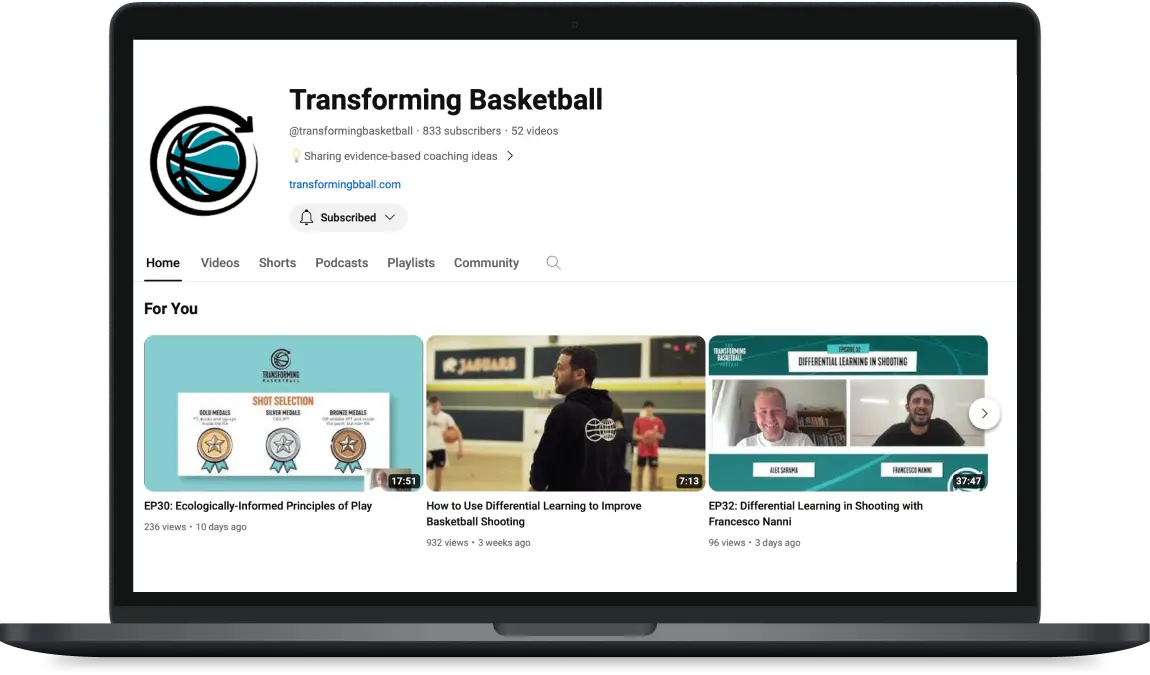Our Mission
To transform the basketball world by helping individuals and organisations make sense of an evidence-based approach
Gain access to 10+ free CLA activities for your next practice Get Access
The ultimate resource for applying evidence-based ideas in basketball
To transform the basketball world by helping individuals and organisations make sense of an evidence-based approach

The field of skill acquisition, known as motor learning in North America, informs the methodologies used at Transforming Basketball. Traditionally, skill acquisition ideas have had little to no impact on sports practitioners.
Transforming Basketball aims to change this narrative by showcasing how critical it is for coaching and organisational approaches to be well-informed by evidence-based ideas. This enables players to effectively develop aligned with empirical evidence as opposed to relying on myths and unsubstantiated opinions. Embracing contemporary ideas means that organisations should be aware of concepts such as variability, representative learning design, purposeful manipulation of constraints, and more.
Transforming Basketball remains on the pulse of the latest research emerging within the skill acquisition community by placing these ideas into a practical context for basketball practitioners of all levels.
A key focus of Transforming Basketball is helping practitioners develop effective interpersonal behaviours and improving athlete experiences through adopting the tenets of transformational leadership.
A healthy environment with positive team dynamics sets the foundation for organisations to fully benefit from contemporary skill acquisition ideas. Transformational leadership focuses not just on performance, but the personal development of every individual within a team.
Transforming Basketball places an emphasis on helping practitioners embrace the concept of transformational leadership by providing players with autonomy, offering authentic support, and acknowledging the players’ feelings and concerns. This differs greatly to the transactional leadership styles which dominate the basketball industry. Research has indicated that a transformational approach is correlated with positive psychosocial outcomes, including enhanced athlete satisfaction, effort, motivation, and group cohesion.
The game of basketball does not occur within a stabilised inner vacuum, but rather a chaotic, complex and ever-changing environment. Within this environment, teams may adopt various principles of play.
Rather than viewing offense and defense through the lens of attempting to control every possession, Transforming Basketball advocates for a principles of play based approach at every level of basketball. As opposed to focussing on rigid game models such as continuity offenses, fixed sets and automatic rules, Transforming Basketball presents the case for conceptual defensive and offensive principles that align with an ecological dynamics rationale.
Creative analogies and the CLA are used to shape such principles, developing players that can be adaptive performers in any environment. Principles of play provide a framework for practitioners in any role to shape their approach, as well as ensuring that player development occurs within the context of how players play within 5-on-5. This means shifting away from many of the rehearsal-based drills that form a key part of the traditional approach within basketball.
Developing dexterity is a key part of Transforming Basketball’s player development approach. As defined by Nikolai Bernstein, dexterity is the ability of a player “to find a motor solution for any external solution.”
This requires players to exhibit functionality within a variety of basketball skills by passing, finishing, shooting and ultimately moving in several different ways. This is the opposite to attempting to engrain fundamentals, hoping that taught techniques can be applied by players at the ‘right’ moment within the game. An essential component of the Transforming approach is centered around identifying the specific rate limiters relative to each player that prevent them from exhibiting functionality within different areas of the game.
Rate limiters can be targeted specifically through the application of a constraints-led approach and differential learning. Strategic variability is embraced throughout this process as opposed to reducing variability through decontextualised ‘on-air’ reps or creating generic variability through games-based approaches. In the words of Professor Keith Davids, players cannot adapt to an environment they don’t inhabit.
The prevalence of organisational silos at all levels of basketball leads to player development not being optimised to its complete potential.
Siloed operating procedures arise when organisations operate with departments such as the front office, coaching staff, athletic performance, physical therapists, analytics team, sports scientists and other relevant staff members working independently as opposed to in close coordination.
Through adopting shared theoretical frameworks to view the game, organisations can ascend out of siloed thinking and adopt highly unified organisational approaches. Professor Martyn Rothwell’s ideas on the Department of Methodology have been highly influential in shaping our ideas within this area.
The prevalence of organisational silos at all levels of basketball leads to player development not being optimised to its complete potential.
Siloed operating procedures arise when organisations operate with departments such as the front office, coaching staff, athletic performance, physical therapists, analytics team, sports scientists and other relevant staff members working independently as opposed to in close coordination.
Through adopting shared theoretical frameworks to view the game, organisations can ascend out of siloed thinking and adopt highly unified organisational approaches. Professor Martyn Rothwell’s ideas on the Department of Methodology have been highly influential in shaping our ideas within this area.
Skill Acquisition
Transformational Leadership
Principles of Play
Player Development
Unified Approach
Player Development








